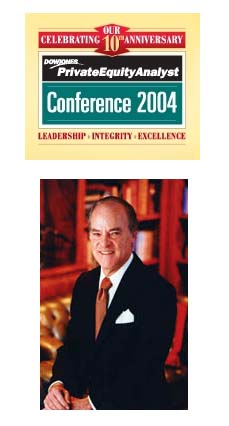trade
event
"Any fool can buy a company; just pay enough" - Henry Kravis
 |
Private equity firms (1) typically last just one generation and rarely have leaders as productive as the founders. After they're gone, egalitarianism rears its ugly head, bringing down the returns of all the other partners. To make things worse, there are no funds set aside today to return to the partners of the future in the form of outsized bonuses that drew them to the firm in the first place.
It's an ironic reversal of the challenge faced by low-cost operations: payroll costs increase as their associates reach tenure with the company, making their business model obsolete. How does a firm overcome the challenges that come with a long and successful existence?
This conference, hosted at the Waldorf in New York, on Sept 21 and 22, brought to light the unique challenges facing private equity partnerships, indeed, the entire professional services sector: How can the firm be structured so that partners continue to make money when a founder is gone?; How does the firm address succession planning?; How does the firm recruit and inculcate firm culture in junior associates?
Henry Kravis, arguably the dean of the private equity industry, presented his firm's remarkable solution to this problem. Functioning more like a management consulting firm, his funds buy the biggest of the big, turn them around by putting brilliant management in place and instituting other efficiencies, to then sell them. "Don't congratulate us when we buy a company; congratulate us when we sell it." Since Kohlberg Kravis, & Roberts have skin in the company along with management, the incentive to make the firm profitable the right way - meaning, there's never been a fraud or scandal in any companies private equity firms invest in - is overruling.
This structure presents enormous opportunities for vertical and lateral movement within the KKR employment model. Junior associates must be the crème of the crop to get in. And once they're in, they never leave. According to Kravis, in the firm's 29-year history, just 11 have left (or died). And virtually everyone is guaranteed a fortune. This is a similar alternative to the employment model instituted here at our firm (2): smaller, simplified tasks that lead to increases in productivity, with transparent professional development opportunities that deliver efficiencies at all levels. Although this model is not recommended for every size business, it creates a natural working environment where top performers are quickly identified for their contribution to firmwide productivity, in any form that may take.
This is why so many consultants in all professional services areas ultimately end working on the client side. There's very little money in making someone else rich. And when professional service providers acknowledge this self-interest in their workers, they'll have a more motivated and productive workforce.
A lighter and memorable moment during the morning of the first day of the conference came when David Rubenstein, Managing Director & Partner of The Carlyle Group LP, was asked about his thoughts on the criticism his firm has endured in recent months as being a "shadow government", particularly in the documentary "Fahrenheit 9/11". Upon seeing the movie with his kids, they asked him what's going on over at the firm, to which Rubenstein replied, "Do you like your lifestyle?" He elaborated: being in Washington, D.C. his firm naturally attracts former politicians and government personnel. In order to avoid a conflict of interest, most of these people's sole responsibility to the firm is to travel around the world talking to investors. Rubenstein blames himself for poor press relations.
Write to Al Berrios at editor@alberrios.com
1 Private equity funds are partnerships, typically with the management of a company in which these funds buy with the goal of taking private, to later spin off at a premium. They're lightly regulated, and benefit from large credit lines that collateralize their billions under management to borrow as much as 10 times more. They are different from hedge funds, which are also lightly regulated, highly lucrative managers of sophisticated investments into companies (not outright purchases), lead by rich people and well-endowed institutions (i.e. universities, state pension plans). Their popularity has increased with their proliferation. Although they've been around for decades, entry fees are in the millions, and not for the common investor.
2 "Employers Are Overworking and Not Appreciating Their Workers"
Top
Related alberrios.com Sections
- HR Management Analyses + Recommendations
Disclaimer:
The recommendations, commentary and opinions published herein are based on
public information sometimes referenced via hyperlinks. Any similarities or
likeness to any ideas or commentary from any other sources not referenced
is purely coincidental. al berrios & co. cannot control any results occurring
from advice obtained from this publication nor any opinion(s) conveyed by
any reader of this publication.
(c) 2004. All Rights Reserved. al berrios & company, inc. Published
by al berrios & co. This Report may not be reproduced or redistributed
in any form without written permission from al berrios & co., subject
to penalty.